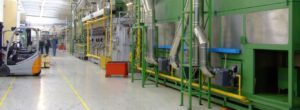Industrial Earthing Solutions : Safety and Efficiency in MEP Construction

Safety, performance, and reliability are not negotiable in today’s MEP construction. Proper earthing is one of the most important yet most neglected components of Mechanical, Electrical & Plumbing (MEP) systems in industrial settings. Industrial earthing solutions are key to safeguarding equipment, personnel, and infrastructure against electrical faults, surges, and risks.
What is Industrial Earthing?
Industrial earthing, or grounding, refers to the method of establishing a low-resistance path for electrical currents to dissipate into the ground safely. Earthing is an elementary part of MEP services that makes it possible for electrical systems to function both safely and efficiently. Electrical systems, if not properly earthed, can be extremely harmful, incurring damage to equipment, causing fires, and even risking human lives through electric shocks.
Importance of Earthing in MEP Construction
For the integration of plumbing, mechanical, and electrical systems in MEP civil construction, careful planning is necessary. Earthing in MEP construction is necessary for a number of reasons:
Safety of the Personnel : Earthing properly keeps the workers and operators away from electric shock, maintaining a secure industrial setup.
Protection of Equipment : Electrical panels, industrial machinery, and sensitive equipment are protected from voltage spikes and lightning attacks.
System Reliability : Effective earthing reduces electrical disturbance and noise, making MEP systems function smoothly.
Regulatory Compliance : Industrial constructions are required to follow international safety regulations and codes, which mandate effective earthing.
Types of Industrial Earthing Solutions
A number of earthing methods are utilized in industrial environments based on the soil type, structure, and MEP system type :
Plate Earthing
Uses a galvanized iron or copper plate that is buried underground.
Widely employed in MEP in electrical projects for power distribution panels.
Pipe Earthing
Uses a galvanized steel or copper pipe driven into the ground.
Applicable to industrial locations with high current systems.
Strip or Wire Earthing
Involves copper strips or conductors buried underground, offering a low-resistance path.
Used for massive scale MEP services for factories and industrial plants.
Chemical Earthing
Utilizes conductive chemicals to enhance soil conductivity around the earthing electrode.
Most desirable in regions with low soil conductivity.
Integration with Mechanical, Electrical & Plumbing (MEP) Systems
In MEP building construction, earthing is not just applied to electrical systems. It is also used to play a significant part in:
Mechanical Systems : Shields motors, compressors, and HVAC equipment from electrical failure.
Plumbing Systems : Shields against possible stray currents that may lead to corrosion of pipes.
Electrical Systems : Guarantees the safe and efficient performance of switchgear, control panels, and transformers.
Effective coordination between MEP disciplines guarantees that industrial earthing solutions are optimized for safety and performance.
Best Practices in Industrial Earthing
To have effective MEP in civil engineering projects, follow these best practices:
Soil Resistivity Testing : Test the soil for determining the optimum earthing method.
Material Selection : Employ high-quality copper or galvanized material for enduring performance.
Regular Maintenance : Regularly inspect and maintain earthing systems to avoid degradation over time.
Adherence to Standards : Adhere to IS, IEC, or NEC standards for industrial earthing.
Conclusion
Industrial earthing is a critical part of MEP civil engineering and MEP services. From personnel protection to equipment longevity, an effective earthing system improves the safety, efficiency, and reliability of industrial facilities. Earthing solutions need to be given precedence by engineers and project managers during the MEP construction period to eliminate costly downtime and risks.


